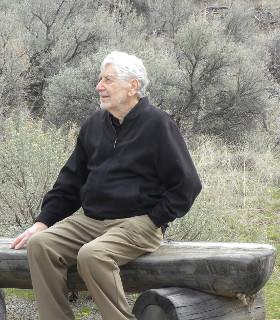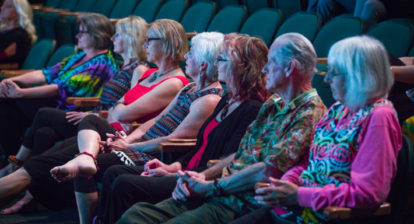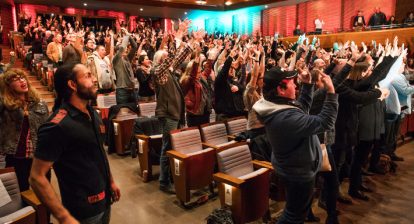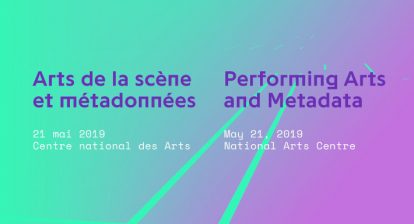10 janvier 2017 – L’année des grandes fêtes est commencée. Et qui dit grandes fêtes, dit grands spectacles.
Les arts du spectacle n’ont pas leur pareil lorsqu’il est question de rassembler des gens d’horizons différents, de créer des expériences communes et de susciter un sentiment d’appartenance. Les membres de CAPACOA le savent mieux que quiconque. C’est pourquoi bon nombre d’entre eux se préparent à fêter le 150e anniversaire de la confédération en chant, en danse et en jeu.
Pendant toute cette année anniversaire, nous allons publier des Vignettes Canada 150 mettant en lumière les activités présentées par nos membres. Nous commençons aujourd’hui avec une réflexion de George Zukerman. Suivront des vignettes sur Arts Commons, Red Sky Performance et plusieurs autres. Si vous célébrer le 150e en spectacle, laissez-nous le savoir : il nous fera plaisir de relater vos activités dans l’une des prochaines Vignettes Canada 150.
RENAISSANCE OF CLASSICAL MUSIC ORGANIZED AUDIENCE
New concert activity in B.C. mirrors earlier start in 1956
By George Zukerman, O.C., O.B.C.
 In my fourth [or is it the fifth?] career retirement, I seem to have reverted to my youth, and find myself once again involved in exactly the same kind of project that was first initiated in 1956 when I launched Overture Concerts in Nelson, BC.
In my fourth [or is it the fifth?] career retirement, I seem to have reverted to my youth, and find myself once again involved in exactly the same kind of project that was first initiated in 1956 when I launched Overture Concerts in Nelson, BC.
At that time – long before touring grants were a recognized facet of Federal and Provincial funding, long before CAPACOA, OSAC or the BC Touring Council ever existed, long before anyone had invented the words “block-booking” – I successfully organized the first all-Canadian block booking network.
At its heyday, there were 78 towns and cities – Overture Concert Associations –from Port Hardy, BC to Glace Bay, NS affiliated with a single central booking service. It was unprecedented. Until then the “organized audience” had been the exclusive domain of Columbia Artists’ Community Concerts. Indeed, after World War II, many Canadian towns and cities affiliated for touring concert programmes with that legendary New York booking service. In the 1950 eyes of the New Yorkers, all of Canada – at least from Winnipeg West – was a gigantic suburb of North Dakota. We changed that, dramatically.
As Maclean’s magazine wrote in 1964, “Overture Concerts and George Zukerman outsmarted the Americans at their own game!” Jack Wasserman, of the Vancouver Sun dubbed me the “Hurok of the Hamlets”.
Of course it wasn’t only “hamlets”, although smaller centres such as Ft. Smith and Inuvik in the NWT were included, along with Macklin SK and Gibson’s Landing BC. The Overture phenomenon in the 60’s and 70’s also embraced New Westminster, Medicine Hat, Swift Current, Brandon, Kenora, Timmins, Flin Flon, Red Deer, Kelowna, Revelstoke, Regina, Edmonton, Thunder Bay, Yellowknife, West Vancouver, White Rock and many, many others. Almost every mid-size and small community on the Prairies and in BC and some of the larger cities, too as far East as Northwest Ontario was at one time or another affiliated with Overture. In the late 80’s, when Community Concerts withdrew from the Canadian market, Overture even expanded to the Maritimes. Tours in those days were seldom shorter than fifteen to twenty concerts, and they provided many Canadian artists with a fascinating geographic overview of their own nation.
Today, although there is a huge developed network for general programming, some of us feel that core classical artists are badly underserved. With obvious exceptions – mainly in the larger cities – concert series with essentially classical programming are having a hard time surviving. The classical artists who used to fill those country-wide tours are on equally tenuous ground. Some of them end up watering down their programming until the content becomes hard to distinguish from the myriad of pseudo-classical offerings which has been endlessly created to fill an apparent market need. Others turn to an assortment of Coffee Concerts, House concerts, informal outreach concerts, for focussed, but limited audiences. The casualty remains the potential adult classical concert audience.
Fast forward to 2013….That was the year I quit the concert stage, and deliberately sold my bassoon to a colleague who I knew would give it a good home. That was also the year I started talking to friends and contacts in several smaller centres which, as far as I could tell, until that time had no active experience with a regular concert series. I found a surging, almost electrical, pulse of interest in classical programming. Stimulated by powerful memories of the 50’s and 60’s – I realized that the “organized audience” was ready for a 21st century renaissance.
Indeed, small towns are re-discovering that they can plan successfully for a vibrant concert-life. As long as they are prepared to make the commitment to quality, they can retain a strong classical content in that new found life. Most important of all, they realize that it is possible to become a concert presenter without financial risk. The “organized audience”, firmly based on advance subscriptions, and a “no single tickets policy” cannot fail financially. It can only succeed at whatever level the membership revenue allows.
We began the Renaissance in Parskville, BC, where, in the course of three seasons, Oceanside Classical Concerts has become a significant classical presenter on Vancouver Island. Ex Air-Canada Senor pilot David Douglas has helped build this new series to where it enjoys a sold-out membership of 300. His two guiding rules – quality classical product, and absolutely no single ticket sales – have paid off. This year he is presenting André Laplante, The Poulenc Trio and friends, the Canadian Guitar Quartet and Kai and Catherine Gleusteen with the John Avison Chamber Orchestra.
At the same time, a unique mini series was launched in Brentwood , a district of thriving and bustling Burnaby. Brian Fraser, Minister of the Brentwood Presbyterian Church launched an 85 capacity organized audience in his tiny neighbourhood chapel. He is struggling to maintain his membership, but has still managed to present the Bergmann Piano Duo [complete with two Faziolis from Manuel Berenschak’s Showcase Pianos] musica intima and the Borealis Quartet. Not bad for an 85 membership group! Again – quality and subscriptions only!
And now as we approach the Canada sesquicentennial in 2017 we have two new communities ready to join a revitalized classical touring circuit – Port Alberni and Agassiz. Both have just completed successful first season subscription campaigns, and both are looking to the future with newly created concert opportunities for the Elmer Iseler Singers, Canadian Guitars Quartet, Touch of Brass, Bergmann Duo, Borealis and music itima, Bo Peng. Pianist and distinguished pedagogue Kirill Bolshakov is the master-mind behind Agassiz’s success. Michael Kozlow in Port Alberni cleverly selected a small venue at the converted church-cum-pub of Char’s Landing to achieve a near sell-out for his opening Port Alberni season.
So, for Canada’s 150th the revival of classical concert audiences is starting – once again – in my home Province of BC. Partly that’s because I don’t travel as often or comfortably as I did in the 50’s and 60’s, but it’s also because I’ve had my eye on several nearby and viable communities that I thought were ready for the experiment.
Certainly, this idea of subscriptions audiences is working, especially for smaller centres where there is a limited audience for very specialized musical genres. It isn’t even a “new” concept. Both Community Concerts in the USA and Overture here in Canada took a leaf from Mozart’s father who had the right idea in 1785 when he described a radical marketing plan in a letter to Wolfgang. “Not a sou is paid at the door” he wrote “And no one without a ticket is admitted, whoever he may be!”
I didn’t mean to paint a completely bleak picture for classical programming across Canada. Here is BC there are notable exceptions in smaller centres – Coast Recitals in Sechelt, White Rock Concerts, Nelson Overture Concerts [yes, they retained the name after all these years, and along with White Rock both are still going strong after 62 years!] Vernon Community Concerts, Kelowna Chamber Music, Trail Performing Arts, Kaslo Concerts, the tiniest of the lot. There are more and I must ask forgiveness for failing to mention everyone who deserves inclusion. But, bravo to all of them….they are our abiding League of Quality. Now they are proudly joined by the new generation of “organized audiences”.
As I look across our land on this 150th birthday year, I still see too many locations in every Province where classical concerts are no longer presented on any sort of regular basis. Some communities have never enjoyed a classical series without financial risk. These are ripe for brand new organization. Others have had successful programmes in the past, which folded either from committee burn-out or in the face of relentless competition from gleaming new facilities. With a little encouragement, many of them could resume, scheduling classical events in those same under-used theatres that once contributed to their demise.
It’s already happening in BC. It’s overdue to spread throughout the land. Perhaps here’s a funding project for the 150th celebrations. $150,000 should do it, with a reasonable prognosis of 10 new concert societies in each of the next five years. I’m ready to work with anyone who has the courage to join in the massive job needed to bring back classical music to its deserved, but neglected status.
Racontez votre version du Canada 150
Nous voulons savoir comment vous allez célébrer le 150e anniversaire de la confédération. Peu importe l’envergure de vos événements, ils méritent tous d’être mis en valeur.
Voici comment ça va se faire :
- Vous nous envoyez une courte description de votre activité ou événement et une photo (avec crédits). Il peut s’agir de la description d’une activité à venir ou du compte rendu d’une activité passée.
- Nous diffuserons ensuite votre vignette sur notre site web, dans les médias sociaux et dans notre bulletin électronique.
Actualités précédentes
Attirer le spectateur solitaire
Loisirs et culture : de bonnes et moins bonnes nouvelles selon l’Indice canadien du mieux-être





